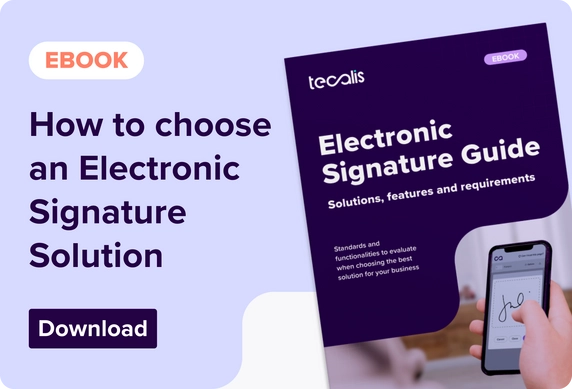Index
Get the latest news right in your inbox
Digital transformation in companies requires agile, secure and compliant processes. Adopting a digital signature solution for enterprises is no longer a futuristic option, but a strategic reality that directly impacts productivity, cost reduction and the experience of both customers and employees. However, the e-signature ecosystem is diverse, with different types, security levels and regulatory frameworks that it is crucial to understand in order to make the right decision.
This article delves into the concept of electronic signature for companies, covering its various typologies, advantages and the implementation of customized solutions. It also establishes a comparison between digital signature and digital certificate, and examines the current legal framework, based on the eIDAS regulation.
What is the electronic signature or digital signature for companies and how does it work?
The electronic signature is a tool that verifies the identity of the signatory and guarantees that the document has not been altered after it has been signed. Its implementation in the business environment facilitates document management and the digitalization of processes, eliminating the need for physical supports and speeding up decision making.
In general terms, the digital signature is the electronic representation of the handwritten signature, by means of which the authenticity of a message or document is validated. The technology behind this tool is based on complex cryptographic algorithms, which ensure that the information is confidential and that the signer is who he/she claims to be.
It is an essential tool that is already used by practically all companies. From micro-SMEs to large corporations, electronic signatures are present in all documents to provide legal validity, reduce paper and have a proper management of data in accordance with standards such as eIDAS or the RGPD.
Types of electronic signature for companies: eIDAS standard
EU Regulation No. 910/2014, known as eIDAS (electronic Identification, Authentication and Trust Services), is the regulation governing electronic identification and trust services for electronic transactions in the EU internal market for electronic signatures to be used by businesses.
This regulation not only harmonizes legislation among member states, but also defines three types of electronic signature, establishing a hierarchy based on their security levels and technical and legal requirements:
Simple electronic signature (SES)
Simple electronic signature (SES) is a basic digital authentication method used in low-risk processes. It can be easily implemented using techniques such as scanned images of signatures, passwords or PINs. Although it has legal validity, its security level is lower than that of advanced or qualified signatures, so it is recommended for internal documents and low-impact approvals.
Advanced electronic signature (AES): technical features and security
The advanced electronic signature represents a balance between security and usability, providing a higher level of protection without reaching the strict requirements of a qualified signature. Its main features are:
- High level of security
It uses robust cryptographic algorithms that guarantee the integrity of the document and prevent any type of alteration after the signature. Authenticity is verified through the exclusive use of the signer's private key. - Non-repudiation
Being uniquely linked to the signer's identity, the advanced electronic signature prevents the signer from denying his or her participation in the process, which is crucial in commercial and legal transactions. - Real-time verification process
Many platforms that implement advanced electronic signatures allow instant verification of the signed document, facilitating audits and internal control processes. - Applications in critical sectors
This type of signature is ideal for sectors where security is paramount, such as the financial sectors, legal, health and technology . Its implementation ensures that processes are reliable and comply with international standards.
The use of advanced electronic signatures is particularly suitable for companies that handle sensitive information and need to ensure the authenticity and integrity of each digital transaction.
Qualified electronic signature: digital certificates and administrative procedures
The qualified electronic signature is the level associated with the digital certificate and is used in those processes related to the public administration. Its main characteristics are:
- Qualified digital certificates
These are based on digital certificates issued by organizations such as the Fábrica Nacional de Moneda y Timbre (FNMT) and can be loaded into electronic signature tools such as Tecalis to be used for signing. These certificates guarantee that the signer's identity has been rigorously verified, offering one of the highest levels of trust. - Compliance with strict legal requirements
The qualified electronic signature complies with all the requirements established in the eIDAS regulation for transactions with administrations, giving it the same legal validity as a handwritten signature in all member states of the European Union. - Certificate management on specialized platforms
Tools such as Tecalis Sign offer a digital certificate manager that makes it easier for companies to issue, renew and control these certificates. This functionality is essential to maintain a signature process that is always up to date and compliant with regulations.

How to sign a document in your company using electronic signature
The process of signing a document electronically has been greatly simplified thanks to the existence of specialized platforms such as Tecalis Sign and the evolution of digital technology. The following is a general procedure that can be adapted to the needs of any company:
- You log in to your electronic signature platform for companies: Access your account on the specialized platform such as Tecalis Sign.
- Select the type of electronic signature: Choose the method or level of signature required according to the security and validity needs of the document.
- You choose the document or template and upload / use it: Upload the file needed for the signature (compatible with common formats such as PDF, Word and other industry-specific formats) or use a predefined template.
- Choose the type of sending: Configure how the document will be sent to the different signatories (for example, simultaneously or sequentially).
- You edit the document and insert the fields: Add the necessary spaces for signatures, initials, dates or other data to be completed by the signatories.
- Add signatories: Enter the information of the people who must sign the document.
- Sent for signature: Starts the signature flow by sending the document to the designated users.
- Users sign: Each signatory receives the request, verifies their identity using the established method (password, SMS, digital certificate, etc.) to guarantee that they are who they say they are, and applies their electronic signature. The platform incorporates metadata such as date and time.
- You receive the signed document in your company's systems if it is via API or in your e-signature platform for companies: Once everyone has signed, the completed document is available. You can access it on the platform or receive it directly in your business systems (via API). A complete digital record (audit trail) is generated to ensure the integrity and traceability of the process for future audits.
The use of tools such as Tecalis Sign allows companies to streamline processes and reduce dependence on physical documents, ensuring a transition to a more modern, secure and efficient document management.
Automate your company's workflows with e-signatures
Electronic signatures not only enable the validation of documents, but can also be integrated into automated workflows, optimizing internal management. The automation of these processes brings multiple advantages:
- Modes of sending electronic signatures:
Depending on the needs of the process, various modes of signature collection can be implemented: - Parallel mode
Allows multiple users to sign a document simultaneously. This method is ideal for collaborative processes where approval from multiple departments is required at the same time. - Sequential mode
Establishes a specific order in which each signer must apply their signature. This facilitates the monitoring and control of the process, ensuring that each step is performed in an orderly and verifiable manner. - Mixed mode and envelopes
Combines elements of parallel and sequential modes, allowing greater flexibility in complex processes where some signatures can be obtained simultaneously and others in an orderly fashion. - Integration with other systems and APIs
Automation allows the electronic signature tool to connect with other management systems (CRM, ERP, BSS, etc.), simplifying document management and reducing data duplication. - Notifications and tracking:
Advanced platforms offer automatic alerts and notifications, reminding pending signatories and facilitating real-time monitoring of each phase of the process. - Auditing and control
By digitizing and automating the signature process, detailed records are generated that allow for periodic audits, ensuring that each transaction complies with current security standards and regulations.
With these functionalities, the electronic signature becomes a key tool to modernize and automate internal processes, allowing companies to improve efficiency and reduce response times in their transactions.
Cases of use of electronic signatures in companies
The implementation of electronic signatures in the business environment extends to multiple sectors and areas, making it possible to optimize processes and guarantee the security of critical transactions. The following are some examples of its use:
- Financial and banking sector
Financial institutions use electronic signatures for account opening, loan formalization, investment contracts and transaction approval. Cryptographic security and traceability of the process are essential to meet the high regulatory standards of this sector. - Legal and notarial sector
Lawyers, notaries and legal firms rely on electronic signatures for the validation of legal documents, contracts and powers of attorney. This tool speeds up procedures and guarantees the authenticity of agreements without the need for physical presence. - Real Estate Sector
The real estate sector uses electronic signatures to optimize and accelerate a variety of critical processes. It is fundamental in the formalization of leases, promises of sale, offers, representation or mandate agreements, and other documents related to property management and transactions. The ability to sign remotely greatly expedites closings, improves convenience for all parties, and reduces administrative burden. In addition, security and traceability ensure the validity of agreements in an industry where transactions are often high-value.
- Public Administration
Government entities implement electronic signatures to speed up the processing of files, the issuance of resolutions and the signing of agreements with suppliers. This improves administrative efficiency and reduces the use of paper, promoting transparency and modernization of the public sector. - Healthcare sector
In the healthcare sector, electronic signatures are used for the management of medical records, informed consents and the authorization of medical procedures, ensuring confidentiality and compliance with data protection regulations. - Human Resources
The digitalization of selection, hiring, contract renewal and personnel file management processes benefits from the incorporation of electronic signatures, facilitating the integration of new employees and streamlining internal communication. - Commercial and logistics sector
Companies involved in marketing and distribution use electronic signatures to validate orders, confirm deliveries and formalize contracts with suppliers. This optimizes the supply chain and reduces response times in critical processes.
These use cases demonstrate that electronic signatures for businesses are applicable to a wide variety of sectors, enabling not only the validation of documents, but also the digital transformation of processes that require high levels of security and operational efficiency.

Tips for choosing an e-signature platform for your business
Choosing the right electronic signature solution is a strategic decision that impacts the security, efficiency and operability of the company. To facilitate this choice, here are some practical tips:
- Regulatory compliance
Verify that the tool complies with eIDAS and other local or industry regulations. Legal compliance is essential for documents to have full legal validity and be accepted in official processes. - Security level
Evaluates whether the solution offers the possibility of implementing advanced (FEA) or qualified (FEQ) electronic signatures when the nature of the transactions requires high levels of security. Check that robust cryptographic algorithms are used and that key management is secure and unique to the signer. - Ease of integration
The tool must integrate seamlessly with existing internal systems (document management, ERP, CRM) and be scalable to adapt to the company's future growth. - User Experience
An intuitive interface and a simple signature process are key to ensuring rapid adoption by employees and external partners. In addition, good technical support and initial training can ease the transition to digitization. - Cost-benefit
Performs a detailed analysis of the return on investment involved in implementing electronic signatures. Considers both the savings in time and resources as well as the improvement in security and regulatory compliance. - Support and updates
Make sure that the vendor offers regular updates and an agile technical support service, so that the tool keeps up with technological innovations and changes in legislation.
These tips will help you select the best option, whether you are looking for a digital signature for high-level companies or a solution that adapts to lower-risk transactions, always guaranteeing the integrity and security of each document.


Benefits of using electronic signatures in your company
The integration of electronic signature tools such as Tecalis Sign in your company's operations provides numerous advantages, both operationally and strategically. These are listed below:
- Agility and efficiency
Digitization eliminates the need to print, manually sign and scan documents. This drastically reduces management times and speeds up decision making, allowing processes to be almost instantaneous. - Cost reduction
By reducing the use of paper, physical storage and logistics, companies reduce their operating expenses. In addition, the risk of loss or misplacement of important documents is minimized. - Security and confidentiality
Thanks to advanced cryptographic algorithms, electronic signatures protect the integrity of information and ensure that documents are not subject to unauthorized modifications. This is especially relevant for sectors where data protection is critical. - Regulatory compliance
International regulations, such as the eIDAS regulation in Europe, recognize the legal validity of electronically signed documents, provided that technical and security requirements are met. This gives digital transactions the same legal force as those made in the traditional way. - Sustainability
The transition to digital processes contributes to the reduction of paper consumption and to the care of the environment, in line with corporate social responsibility policies. - Improving corporate image
Using cutting-edge digital solutions projects a modern and innovative image, generating confidence in customers, suppliers and collaborators.
These benefits make the investment in a digital signature solution for companies like Tecalis Sign strategic and profitable, allowing organizations to adapt to an increasingly competitive and technologically advanced environment.

























